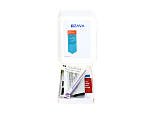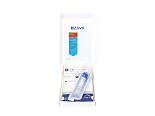Chlamydia and Gonorrhoea Test Kit
Buy Chlamydia and Gonorrhea Home Test Kit: €40




A chlamydia and gonorrhea test allows you to find out whether you have been infected with these common sexually transmitted infections.
The test kit for men is a urine test.
The test kit for women is a swab test, as swab tests are more accurate in women
You should receive your test kit 5 - 8 working days after placing your order. You will collect your sample at home and send it to our partner laboratory in Dublin. Your results will be available within 2 - 3 working days of your sample reaching the lab. All our orders are dispatched in discreet packaging. Delivery and return postage are included.
A test kit for chlamydia and gonorrhea costs €40.



About the chlamydia gonorrhoea test kit
Why get tested for gonorrhoea?
A gonorrhea test allows you to find out whether you have been infected with this common sexually transmitted infection. After chlamydia, gonorrhea is the most common STI. Getting tested makes sense if you have had unprotected sex or if you have been experiencing symptoms such as discharge from the penis or vagina. If you have been diagnosed with a different STI or know that a previous partner has received a positive gonorrhea test result you should also consider getting tested.
If you know that your partner has had unprotected intercourse with other partners you may also wish to do a gonorrhea test, to make sure you have not caught gonorrhea. It is particularly important to consider a test if you are pregnant or trying for a baby. Gonorrhea can be passed from mother to baby during childbirth, so it is important to know whether the infection is present. Since the infection does not always result in symptoms, a gonorrhea test is often the only way to be sure you are healthy and to prevent an existing, unnoticed infection from spreading to other body parts.
Why does the gonorrhoea test check for chlamydia as well?
Both infections are very common and frequently occur in combination. They are transmitted in the same way, can both be symptomless and cause complications such as infertility if they go unnoticed. If you use our gonorrhea test kit, we will also let you know if any evidence of chlamydia is found, so you won’t need to take an additional test. If you would like to get tested for other sti’s too, you may wish to take our extended STI test.
How does a gonorrhoea test work?
We offer two types of test kits, a urine test for men and a swab test kit for women. Urine tests are slightly less accurate in women, which is why women are advised to use the swab test version. Both test kits are easy to use and you will be able to collect your sample within minutes.
The gonorrhea test for men requires, that you collect a sample of your urine, using the test kit provided. The test kit contains a leaflet with instructions as well as two plastic containers, one of which you will use to collect your urine. It is important that you use the label included in the package and affix it to you sample, otherwise the laboratory will not be able to analyse your specimen.
The gonorrhea test kit for women consists of a swab test, used to gather a sample from the vagina. It is as quick as the urine test and requires you to use a cotton swab. You should avoid using vaginal creams or treatments prior to collecting your sample. Gonorrhea can be found in the bodily fluids present in the sexual organs. If you have gonorrhea, the analysis of your urine sample or swab show a positive result.
Does the gonorrhoea test kit detect anal and oral gonorrhoea?
This test kit is not suitable for detecting anal or oral gonorrhea. If you have had unprotected anal or oral sex, visit your local doctor to get tested.
When to test
The test may not detect an infection which has occurred within the past few days and the test should ideally be carried out at least 2 weeks after the episode of unprotected sex that you are worried about. If left untreated, the infection may spread. By the time you experience symptoms of gonorrhoea, you may be suffering from complications and you may have passed the disease on to your partner.
What if my test result is positive?
If you test positive for gonorrhoea, you will need to be treated. The infection is very easy to treat with antibiotics, which you can get from your local sexual health clinic or GP.
If your result is positive for either chlamydia or gonorrhea, you many need to get in touch with your sexual partners to let them know they may also have the infection:
- You should tell all sexual partners you've had in the last 6 months
- If you haven't had any sexual partners in the last 6 months, you should contact your most recent sexual partner to let them know
Any sexual partners you tell should talk to a doctor about treatment or getting tested.
If you test positive for chlamydia you may be able to get treatment through our service. Just answer a few simple questions in our questionnaire, place an order and, if it is appropriate, one of our doctors will prescribe and issue treatment for you.
You can avoid infection by using a condom every time you have sex regardless of whether you are having oral, anal or vaginal intercourse. You should ideally only have unprotected sex if you and your partner have both tested negative for STIs.
What if my result is negative?
If you've received a negative test result but keep getting symptoms, you should get help from a doctor. False test results are rare, but no test is 100% accurate and on rare occasions you can get a negative result even when an infection is present.
When should I get tested?
Gonorrhoea and chlamydia take at least 2 weeks to show up on a test, so it’s important to wait until after this time to get tested. Testing before this time may lead to you getting a negative result even if you have the infection.

Dr Simran Deo qualified from St George’s, University of London in medicine in 2006 with a distinction in her written finals. She went on to specialise in general practice, obtaining the MRCGP certification in 2012. In 2014 she received a merit for the Diploma in Dermatology from Cardiff University.
Meet our doctorsLast reviewed: 30 Apr 2020
